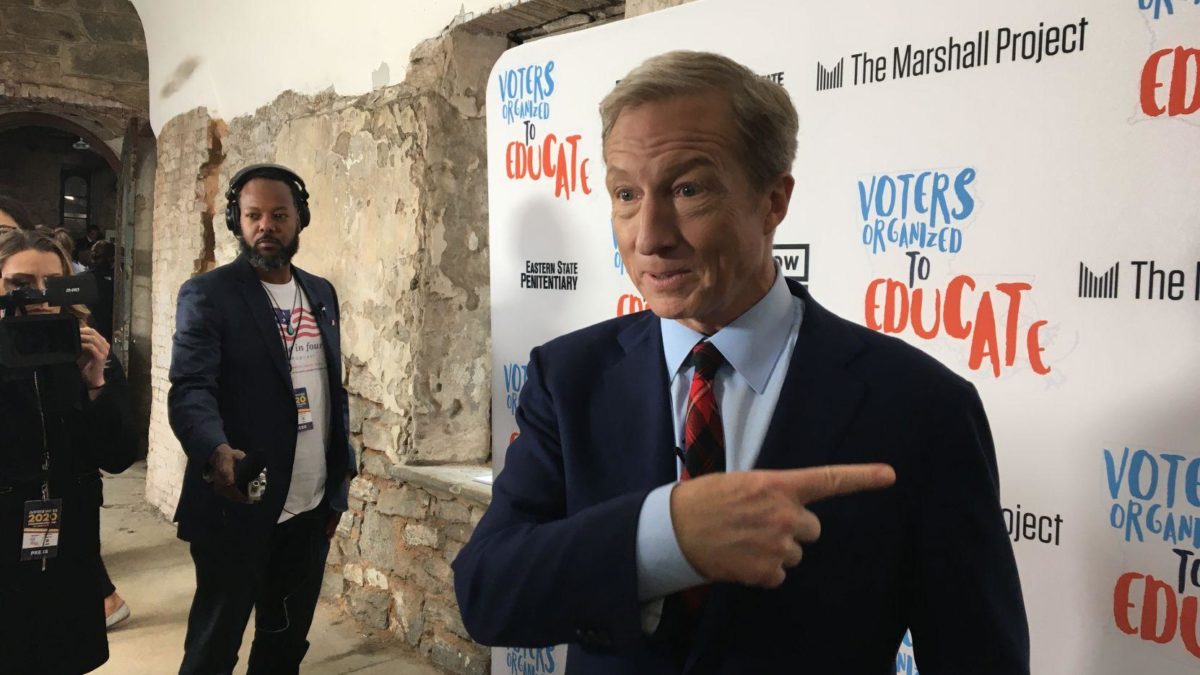It might sound a bit harsh to compare billionaire 2020 presidential candidate Tom Steyer to Donald Trump, but don’t let Steyer’s normative capacity to speak in complete sentences fool you.
When it comes to the essential presidential skill of knowing your shit – that is, knowing the nitty gritty details of policy issues and the most effective policies to deal with them – Steyer, like Trump, falls hopelessly short.
We learned this in the afternoon of Oct. 28 at the Justice Votes 2020 Town Hall at Eastern State Penitentiary where Steyer, standing before 100 people who’ve been negatively affected by the criminal justice system, resembled a 12th-grader bragging of his extensive arithmetic skills to a room full of Ivy League math professors.
“This country started with massive, deliberate, legalized injustice and racism,” Steyer said, stating the obvious near the beginning of his 30-minute slot onstage. He was centerstage, flanked with moderator and MSNBC journalist Ari Melber to his right and host DeAnna Hoskins on his left. Hoskins, who was formerly incarcerated, serves as an advisory board member to Voters Organized to Educate, an organization that seeks to restore rights to formerly incarcerated people.
Hoskins asked Steyer about his feelings regarding having a “protected class” of people in America – that is, in short, people who have the ability to sue when treated unfairly, which isn’t always the case for people in minority communities. When Steyer proceeded to ramble aimlessly about ending discrimination without answering the protected class question, Hoskins called him out on it, blowing Steyer’s cover.
His response? “Here’s the answer to your question, DeAnna,” – here it comes – “what does a protected class mean?”
The moment was a quintessential example of a Trumpishly unseasoned, noobish pseudo-politician having an I’m fucked moment and failing to recover. Steyer botched similar questions throughout his appearance, most notably Melber’s straightforward question about whether any of his businesses have ever hired a formerly incarcerated person. After a six-second awkward pause (which was timed by PW), Steyer not-so-brilliantly made the split-second decision to evade the question by conveniently asking himself an easier one.
“Let me just answer your question,” he said before proceeding not to, “am I in favor of banning the box [on the job application] so that question can’t be accurately answered? Yes I am.”
Luckily for those in the audience who were hoping to hear some intelligent answers, New Jersey Sen. Cory Booker graced the stage upon Steyer’s exit. Booker said all the right things and underscored an oft-ignored tenet of the country’s criminal justice system. He spoke not only of black plight within a racist system, but also of the rich, predominantly-white grifter class.
“You have a nation that went through a financial crisis where people were coming into neighborhoods like Newark and [pulling] all kinds of mortgage scams,” Booker ranted, elegantly. “You had rating agencies on Wall Street rating trash as treasure, people crashing the whole economy – nobody goes to jail virtually.”
He also railed against pharmaceutical companies for, as he sees it, creating the opioid crisis.
“I will hold the pharmaceutical companies who’ve done these crimes accountable, and I will do it with a seriousness that begins to restore people’s faith that we have a justice system that doesn’t just work for the wealthy, it works for all Americans.”
It’s the right answer, but Booker’s newfound hostility to pharmaceutical companies is interesting. In 2017, he stopped accepting donations from the industry amid criticism of being too cozy with it. It begs the question: would 2016 Cory Booker have made that same comment?
Somewhere in between Booker and Steyer on the competency-o-meter was California Sen. Kamala Harris, who mostly said all the right things, albeit saying them like a rapper (during her talk there was a “let’s talk truth,” a “you hear me?” and a “you know what I’m talking about”). Unfortunately, she dodged questions about her spotty past as a prosecutor in California – something all voters deserve serious answers to.
But she made up for it by taking hardline stances on legalizing marijuana, ending solitary confinement (she called it “inhumane” and “unnecessary”) and recognizing the country’s failure to adequately support people who are recently released from prison in getting their life back on track.
“The incarceration system of America has not been humane,” Harris said. “There must be accountability, but there also must be a path.”
Unfortunately for Harris, Booker and especially Steyer, there must also be a path to nomination. Right now, it’s not looking pretty for any of them. Of the three, Harris polls the best nationally at merely 5.3 percent, according to RealClearPolitics’ national polling average. That’s compared to the top three, Joe Biden, Elizabeth Warren and Bernie Sanders, who are at 27.5, 21.7 and 17.7 percent, respectively.





